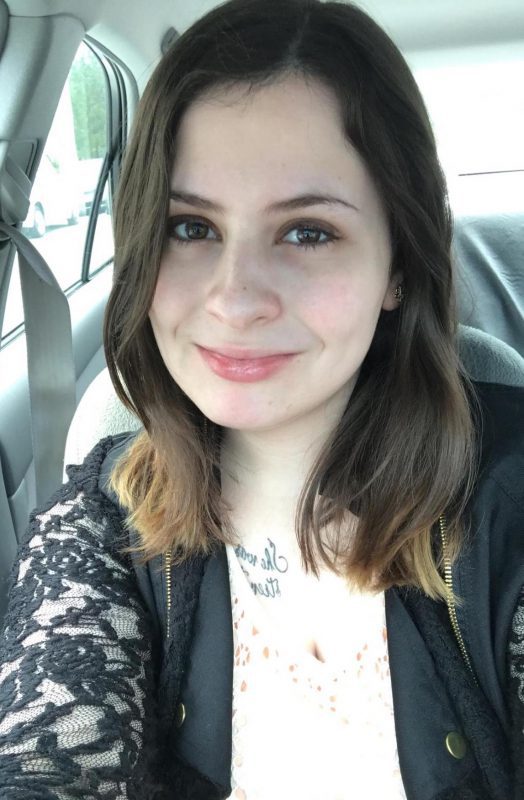SC Humanities is pleased to announce that two Student Research Fellows have been selected for 2019: Valencia James of Allen University and Ashley Krause of Francis Marion University. Student Research Fellowships are awarded annually on a competitive basis to undergraduate students in their sophomore or junior years attending an accredited university or college in South Carolina to explore research and scholarship in the humanities. The 2019 fellows will conduct humanities research and present their findings in a public program at a South Carolina venue.
 Valencia James is a 26-year-old junior at Allen University. She is a first-generation college student from Winnsboro, South Carolina and hopes to be the first in her family to obtain a Ph.D. Her major is English with a concentration in Professional Writing. Recently, she has found a love for African American Literature—thanks to professors like Dr. Adams. After graduation from Allen in May 2020, she plans on attending graduate school for a masters in African American Studies.
Valencia James is a 26-year-old junior at Allen University. She is a first-generation college student from Winnsboro, South Carolina and hopes to be the first in her family to obtain a Ph.D. Her major is English with a concentration in Professional Writing. Recently, she has found a love for African American Literature—thanks to professors like Dr. Adams. After graduation from Allen in May 2020, she plans on attending graduate school for a masters in African American Studies.
Her proposed project, “Preserving Southern (Her/His)tories in African American Literature,” began in an Advanced Composition class where they discussed the idea of “What might happen if we don’t write?” while reading Zora Neale Hurston’s posthumously released Barracoon. The story of Kossula, Hurston’s subject, could have been lost if no one had thought to write his story down. It reminded James of growing up and listening to her late grandmother tell stories no one ever thought to write down, and therefore, the family lost much of her personal history. The need for writing African American stories ensures that (1) the story never dies with the person and (2) the person lives on though their stories.
 Ashley Krause is a junior psychology major at Francis Marion University in Florence, South Carolina. Although she is originally from the Midwest, she feels like South Carolina is more of a home to her than anywhere else she has lived. The feeling she found when she moved to the South is what inspired her to form her research project, “Sense of Place Dimensions in Relation to Personality in the Rural Experience.” She has become passionate about finding out why one place, often a place you are experiencing for the first time, feels more like home than one you’ve known for your whole life.
Ashley Krause is a junior psychology major at Francis Marion University in Florence, South Carolina. Although she is originally from the Midwest, she feels like South Carolina is more of a home to her than anywhere else she has lived. The feeling she found when she moved to the South is what inspired her to form her research project, “Sense of Place Dimensions in Relation to Personality in the Rural Experience.” She has become passionate about finding out why one place, often a place you are experiencing for the first time, feels more like home than one you’ve known for your whole life.
After Ashley completes her education at Francis Marion, she plans on attending a doctoral program in clinical psychology. She wants to work with patients in psychiatric hospitals and become a professor at a university. In her future career, she hopes to work on research that focuses on keeping the humanities and the social sciences as partners, instead of two separate entities, because interdisciplinary work has the power to strengthen research.
SC Humanities Board of Directors made the decision to begin offering Student Research Fellowships again in 2013 after receiving feedback from deans and professors who attended the Humanities in Higher Education Summits in 2009 and 2011. These academic humanists indicated that there were not many research opportunities available for students majoring in humanities disciplines and that such an opportunity would be encouraging in departments that are often losing funding and majors.
Executive Director Randy L. Akers said: “I believe it is important to support the work of future scholars and professionals in the humanities and to further stress the viability of the humanities in an increasingly technological age.”
SC Humanities looks forward to supporting Ms. James and Ms. Krause in their excellent research plans. For more information about the Student Research Fellowships, including guidelines and application, please visit the website: https://schumanities.org/grants/studentfellowships/ or contact T.J. Wallace at 803-771-2477 or tjwallace@schumanities.org.
The mission of SC Humanities is to enrich the cultural and intellectual lives of all South Carolinians. Established in 1973, this 501(c) 3 organization is governed by a volunteer 21-member Board of Directors comprised of community leaders from throughout the state. It presents and/or supports literary initiatives, lectures, exhibits, festivals, publications, oral history projects, videos and other humanities-based experiences that directly or indirectly reach more than 250,000 citizens annually.
